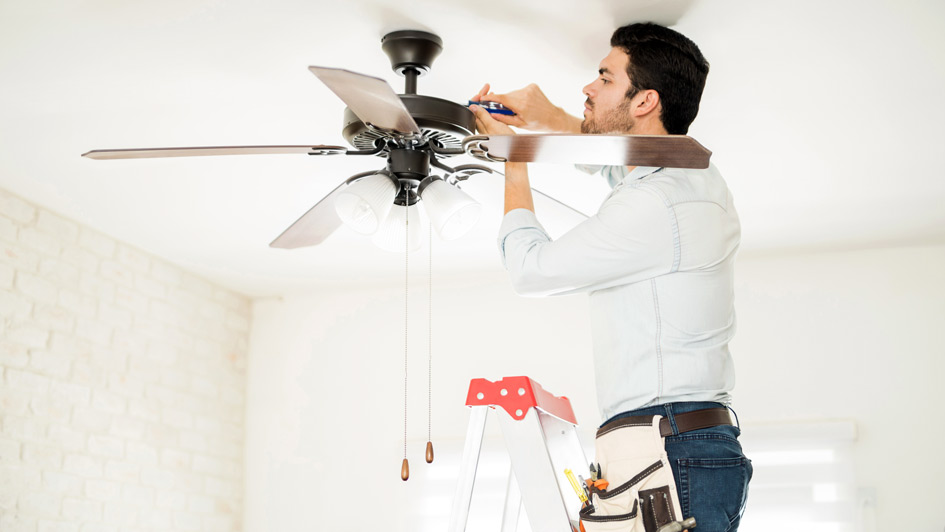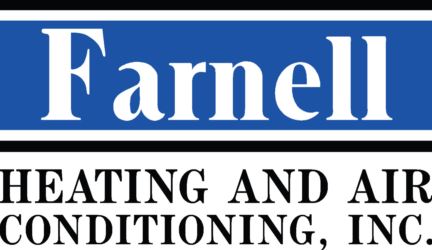
Ceiling fans are one of the most underappreciated ways to increase home comfort and reduce energy costs. By improving air circulation and working in conjunction with your HVAC system, ceiling fans and energy efficiency are truly a natural pairing. They offer a cost-effective, energy-efficient way to maintain your comfort in hot weather while easing strain on your AC—potentially sparing you from unnecessary air conditioning repair.
In this blog, the experts at Farnell Heating & Air Conditioning Inc discuss how ceiling fans can make your home feel more comfortable while saving you money thanks to increased HVAC efficiency. We'll also share some HVAC efficiency tips that take advantage of ceiling fans.
Comfort vs. Temperature: Staying Cool Using the Wind-Chill Effect Indoors
Ceiling fans don’t actually cool the air—they cool you down by moving air over your skin. This is called the wind-chill effect, and it can make a room feel up to 4 degrees cooler without adjusting the thermostat. That means you feel less hot and enjoy the benefits of indoor air circulation from your ceiling fan while minimizing air conditioner use—helping reduce your electric bill in summer.
The Best of Both: Advantages of Pairing Fans and Air Conditioning Together
There are several advantages to using ceiling fans and air conditioning together, especially on hotter days. By combining both, you boost HVAC efficiency and keep your home cooler with less effort from your cooling system.
Benefits of using ceiling fans and AC together:
- Ceiling fans help lower HVAC load by spreading cool air more evenly throughout rooms in your home. Decreasing HVAC stress is important, because it can help you avoid a breakdown that may lead to premature AC or furnace installation.
- Using ceiling fans enhances comfort by reducing uneven temperatures and enhancing circulation.
- Combining ceiling fans and AC can lower your utility usage. If you have a home automation system, you can even modify your smart thermostat settings to bump up the temp a few degrees while your ceiling fan is running.
Clockwise vs. Counterclockwise Ceiling Fan Rotation: Which is the Correct Direction?
To maximize the benefits of your ceiling fans year-round, it’s important to set the blades to rotate in the right direction for the season. The direction affects how air moves, which can either make you feel cooler or redistribute heat so you feel warmer.
When to rotate ceiling fans counterclockwise
On hot days, ceiling fans should turn counterclockwise at a faster setting. This creates a breeze that pushes cool air downward, amplifying the wind-chill effect and making you feel cooler.
When it's best to spin ceiling fans clockwise
When it's cold out, set your fan to spin clockwise on a low speed. This gently pulls cool air upward and circulates heated air down to where you can feel it, helping you feel warmer without changing your thermostat.
What Type of Ceiling Fan Is Best
Picking the ideal ceiling fan depends on a few critical considerations, including blade design, airflow rating and room dimensions. First, look for fans that offer a good balance of ECFM airflow and blade pitch to provide efficient air movement in your space:
- ECFM is the amount of air a fan moves—the cubic feet per minute, or CFM—per watt of electricity it uses. Fans with greater ECFM are the most energy efficient.
- Blade pitch refers to the tilt of the blades. A sharper blade pitch moves more air but can also strain the motor.
Also, consider room size when sizing a ceiling fan—a fan that’s too small won’t move enough air, while one that’s too large may be disruptive in a smaller room.
Raise Your HVAC Efficiency With Help from Farnell Heating & Air Conditioning Inc
At Farnell Heating & Air Conditioning Inc, our HVAC experts can help you stay comfortable while easing the burden on your heating and cooling systems. From efficient ceiling fan strategies and air conditioning installation to smart thermostats and furnace repair, we offer comprehensive services that match your needs. Reserve your appointment by calling 251-471-2674 today.
